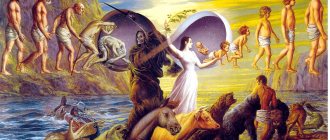Déjà vu is a common phenomenon, references to which can be heard from people of any age and gender in all corners of the planet. People from scientific circles became interested in such a mysterious fact, which defies logical explanation, several centuries ago. Today, it has become possible to understand such a difficult issue precisely thanks to the results of numerous scientific works.
Historical roots of the study of specific effect
For many millennia, humanity did not have the scientific tools to obtain knowledge about inexplicable phenomena, which is why all the strange events that occurred were written off as something supernatural. Modern people have little faith in mysticism, and therefore are eager to receive competent explanations from a scientific point of view about the nature of the deja vu effect.
It is this term that has become widespread worldwide and is used when it comes to describing feelings that are felt by a person as if they had already been experienced before.
The terminology is also excellent for characterizing situations that can be said to have already happened in a person’s life.
The Frenchman Emile Boirac, who is known as a brilliant philosopher, was the first to study this strange phenomenon. It was he who called the mysterious riddle “déjà vu,” and then his followers began to put forward a number of hypotheses regarding the nature of the strange effect.
Initially, a group of brave scientists came to the conclusion that it was all due to severe fatigue of the body, during which it is difficult for the brain to navigate in space, as a result of which it begins to inadequately perceive the surrounding environment. Then other scientists put forward the theory that the hemispheres of the brain process incoming information at different speeds.
After such a bold statement, there was a version from the American specialist Arthur Allen, who suggested that the phenomenon is the result of forgotten dreams. A little later, Sigmund Freud expressed the idea that déjà vu can be explained by the specific work of the subconscious. However, Gustav Jung's idea sounded different, implying that the phenomenon represents the memory of ancestors or arises as a result of the resurfacing of moments from past lives.
...And stories told by mere mortals.
It must be said that very often cases of déjà vu are associated with completely ordinary, banal everyday situations, with meaningless, boring, seemingly boring things: a green car drove by, a man in a hat walked past, music sounded in the distance, rain was falling, the smell of lilacs, in one of the windows a white cat could be seen sitting on the windowsill... It seemed like nothing special. And suddenly... Stop! But all this already happened once!
However, sometimes brighter stories happen.
Here is the experience of déjà vu by a young girl, which Russian researcher of this phenomenon Andrei Kurgan cites in his work:
“My friend and her husband moved to another city. A year later I went to visit her; I had never been there before. The next day they took me to see the sights in their car. They decided to show me the pedestrian boulevard. We parked the car and walked to this place. We talked cheerfully and rejoiced at our meeting. And anxiety grew inside me - it seemed to me that I had already been here and everything was familiar to me. I told my friend about this, but she just laughed. Soon we had to turn the corner, where this boulevard began. I felt a strong heartbeat - even my legs gave way. I say: “Now let’s turn around, and on one side there will be a black and gray church, and on the other there will be a very large store on the mountain, and to enter it, you need to go through many steps. At this point my friend almost slid to the ground. We were very scared, but that’s exactly what happened. The church was Armenian-Greek, 16th century. It was restored only six months ago exactly as I described. And the store had been there since the 19th century, owned by some merchant. He lived there, produced textiles and traded them. The store was also restored, but much earlier, and now it is a department store. Many years have passed since then, I still don’t know what it was, but the sensations were very strong. I was never there again."
And this story is told by a visitor to one of the sites:
“The most vivid deja vu I had was at school, in the seventh grade. The teacher was late, there was complete chaos in the office, everyone was running around. Finally, the teacher comes in, and then I realize that I know: a paper airplane is about to hit his head. I turn around and see that one of the students raises his hand with an airplane and throws it. Then - the screams of the teacher, etc. I knew in advance that everything would happen exactly like this. It was like rewinding an excerpt from a movie and watching it again.”
Versions of the explanation of déjà vu, which are stated in scientific concepts
Today, scientists are closer to solving a centuries-old mystery that has haunted the minds of people. According to the latest concepts put forward, the explanation for the strange effect that affects about half of the world's population could be something like this:
- excessive passion for reading fiction and watching films (imagination in combination with visual memory often produces false pictures); - frequent travel (visual memory is filled with visual images); - the fact of having problems with memory and the inability to remember the situation as a whole; — the presence of disturbances in the functioning of the temporal lobe of the brain (this area is responsible for the formation of long-term memory); - problems in the functioning of the hippocampus (it is responsible for transferring information from short-term memory to long-term memory, and therefore, if there are malfunctions, the present is mistaken for a previous event).
It should be noted that with disorders associated with the activity of the hippocampus and temporal lobe of the brain, the déjà vu effect can haunt a person for a long period of time. You can independently resort to saying your beliefs out loud that all the strange pictures that come in do not fit in with reality. This phenomenon should not be confused with hallucinations, but it would not be a bad idea to visit a psychologist if the strange state continues for quite a long time. Consulting a qualified specialist and following the measures recommended by the doctor will greatly reduce the inconvenience caused by the obsessive state and the appearance of inexplicable sound effects.
To avoid the occurrence of a strange phenomenon in the future, you should start training your intellect as soon as possible and be sure to pay due attention to maintaining intellectual abilities in old age.
Hypotheses, hypotheses...
What sophisticated hypotheses of the origin of déjà vu have not been put forward over the past 100-plus years!
Some explained it by reincarnation - by the fact that the soul does not die with the body, but continues its earthly existence in a new body. But we’ll probably leave this theory alone. Although, to be fair, it should be said that she has many supporters (singer Madonna, for example, claims that when she found herself in Beijing in the imperial palace, she realized that she had already lived here many centuries ago; Keanu Reeves remembers that she was once a dancer in a Bangkok temple; and even such a famous sage as Pythagoras believed in the transmigration of souls - he believed that in a past life he was a rooster). But let’s dwell on other hypotheses.
For example, at the end of the 19th century, it was suggested that déjà vu could be caused by excessive fatigue: when the brain is too busy, its functioning malfunctions - the processes of “perception” and “awareness” are inconsistent with each other.
And vice versa, it was assumed that déjà vu often visits someone who is properly rested and full of energy (the vigorous brain of such a person perceives any complex information so quickly and easily that any new object or phenomenon may seem familiar to him).
The idea was put forward that déjà vu is nothing more than a mild and short-term epileptic seizure (this was motivated by the fact that epileptics, according to researchers, often experience déjà vu immediately before an attack).
The version about dreams still remains relevant (it is believed that deja vu situations are familiar to us because we once received and processed similar information in a dream). In addition, we can recognize not only what we dreamed - perhaps we remember what we have already observed in real life or in a movie, what we imagined before in our imagination...
From past to present
The term “déjà vu” was first used at the beginning of the 20th century by the French psychologist Emile Boirac in his book “Psychology of the Future.” The author used this term to reflect the concept of derealization, which implies a violation of the perception of reality, accompanied by a feeling of unnaturalness and unreality of the environment. Simultaneously with déjà vu, other phenomena were described [1] related to derealization disorders [2–5]:
déjà vécu (if deja vu is the visual perception of information, then déjà vécu is at the level of feelings and emotions; “already experienced”);
déjà entendu (auditory perception, “already heard”);
déjà baisée (motor, sensory, “already tried”);
déjà lu (superimposition of images perceived through reading, “already read”);
déjà eprouvé (emotional perception, “already experienced”);
jamais vu (jama vu, the inverse of the term “déjà vu” - “never seen”).
All these phenomena occurred quite often, and, like many phenomena that are difficult to find an explanation, déjà vu quickly became covered in a veil of secrecy, which many scientists tried and are trying to uncover. Explaining the occurrence of a specific déjà vu is a difficult, sometimes impossible task, because it is impossible to predict the exact time of manifestation of the phenomenon, and it is not so easy to cause it artificially. And since it is difficult to explain this entire complex of phenomena using scientific methods, a large number of dubious theories and incredible, sometimes mystical assumptions arise.
The versatility of déjà vu
Despite the variety of theories explaining the mechanism of déjà vu, scientists have not yet come to a consensus. This means that the phenomenon of déjà vu to this day remains an attractive and mysterious phenomenon, fraught with many unexplained things. But today we can say that everything connected with this phenomenon is important for every person - regardless of what it reflects: the reincarnation of the soul, a surge of the subconscious, an excerpt from a dream or a hidden anomaly. Therefore, the most serious discoveries are yet to come. And if you are lucky enough to see the world “stopped” for a couple of moments, think about it, analyze why this event happened, and perhaps you will discover something new for yourself, because it’s not for nothing that there is a saying: “Everything new is a well-forgotten old "
Is stress to blame again?
Some researchers see the cause of the déjà vu phenomenon in brain trauma. And it doesn’t have to be physical trauma. A severe stressful situation is sometimes enough to disrupt our “on-board computer’s” perception of the past and present. Impaired functioning of the right or left hemisphere of the brain can cause the left hemisphere, which is responsible for memories, to become more active than the right hemisphere, which is responsible for processing new information. This can lead a person to perceive the present as the past. Such problems can happen at any age. However, scientists associate the occurrence of déjà vu with the emergence of an identification crisis in adolescence (15–18 years) and middle age (30–35 years) [8, 9].
Someone else's will
Other people can also impose false memories on us. This theory has been confirmed by a number of experiments. One of them is with preschoolers. The children were asked over the course of two and a half months about how each of them had once had their finger pinched by a mousetrap. Ten weeks later, half of the children could not be dissuaded from the fact that there was no mousetrap.
Related news
Scientists understand the cause of déjà vu
Students took part in another experiment. They were given short descriptions of stories that happened to them as children. Three out of four stories were real, and one case - about how the experiment participants got lost in a supermarket as children - was false. The students were told that they were participating in a study of the possibility of detailed reconstruction of childhood memories. A week later, each participant was asked to tell each of the four stories in more detail. A quarter of the subjects not only “remembered” the incident in the supermarket, but also enriched it with a lot of emotional shades and details.









